
ICCEP
.pdf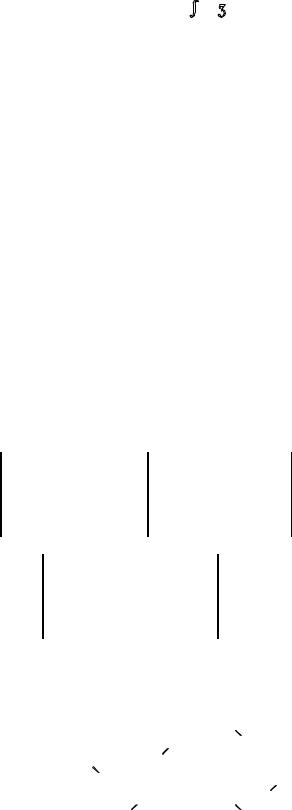
The phonemes [ ], [ ]
In the articulation of the phonemes [ ], [ ] the soft palate is raised. The tip with the blade of
the tongue and the middle part of the tongue are simultaneously raised. A flat narrowing is formed by the tip and the blade of the tongue held close to the back part of the teeth-ridge and by the middle of the tongue raised in the direction of the hard palate. As the middle part of the tongue is raised, these sounds are slightly palatalized. The lips are rounded and slightly protruded. The air passes through the narrowing with friction.
In pronouncing [ ] the vocal cords are kept apart and do not vibrate, whereas in the production of [ ] they are drawn near together and vibrate.
The phoneme [ ] is voiceless; the phoneme [ ] is voiced. In pronouncing the Russian long palatalized consonants [ш’:], [ж’:] the middle of the tongue is raised higher than in the case of the English [ ], [ ]; as a result the Russian [ш’:], [ж’:] are more palatalized. Cf:
[ i:] she – [ш’:и] щи
[ ] shook – [ш’:ук] (as in “много щук”) [ ] measure – [дро ж’:и] дрожжи
In pronouncing the English consonants [ ] and [ ] Russian learners are apt to replace them
by the Russian consonants [ш] and [ж] respectively.
To prevent or correct these mistakes it is recommended to palatalize the Russian consonants [ш] and [ж] deliberately.
Care must be taken, however, not to palatalize [ш] and [ж] too much and not to lengthen them, lest they should be changed into the Russian consonants [ш’:] and [ж’:].
Ex. 3. Read the following words correctly:
[ i:] |
she |
|
[ : ] |
[ ] |
shy |
|
[ ] |
[ ] |
shine |
[ i: ] |
|
[ i: ] |
sheet |
[ ] |
|
[ ] |
|
beige |
|
[ ] |
vision |
|
|
[ ] |
division |
||
[ ] |
decision |
||
sharp |
[ ] |
shut |
ship |
[ ] |
Shelley |
sheep |
[ ] |
shack |
shape |
[ ] |
wish |
[ ] |
collision |
|
[ : ] |
garage |
|
[ ] |
pleasure |
|
[ ] |
measure |
|
Practise reading the following tongue-twister, paying attention to the [ ] and [ ] sounds and memorize it
She Sells Seashells
She 'sells 'seashells on the seashore.|| The 'shells she sells |
Are seashells I am sure. |
So 'if she 'sells 'seashells on the seashore |
Then I’m sure | she 'sells seashore shells. ||
Abutting Plosives
In connected speech at the junction of 2 plosives (with similar articulation) the first of them loses explosion and there appears a short pause between them.
Even if the 2 plosives are of different articulation, one of them loses explosion.
60
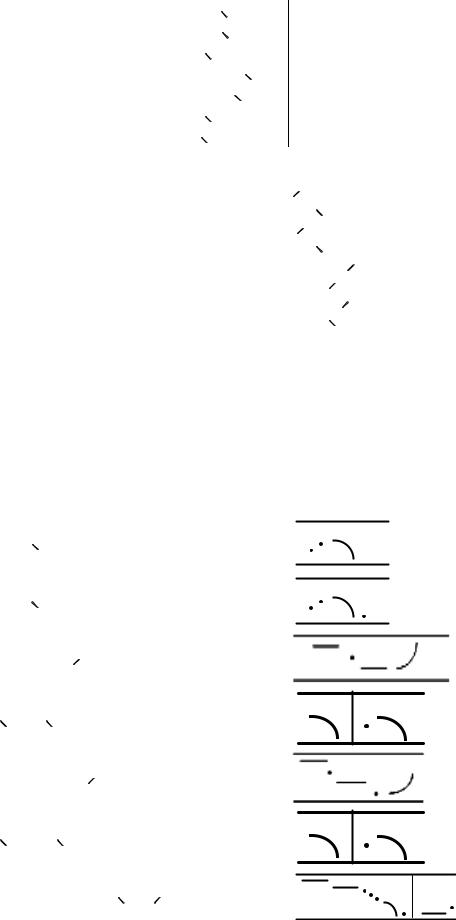
Ex. 4. Read the following phrases. Mind abutting plosives:
[ ] [ ] [ ] [ ] [ ] [ ] [ ]
at that time in that text that day
the second day night and day take Ted
big cut
A Big Black Bug
A 'big 'black bug|
Bit a 'big 'black bear.||
A 'big 'black bear |
Bit a 'big 'black bug. ||
When the 'big 'black bug. |
Bit the 'big 'black bear. |
Then the 'big 'black bear. |
Bit the 'big 'black bug. ||
Grammar Disjunctive questions
(See Grammar Supplement)
Reading material
Read the following sentences paying attention to: a) logical stress; b) abutting plosives;
c) intonation in requests;
1. [ ]
[ ]
2. [ ]
[ ]
3. [ : ]
[ : ]
4. [ i: : i: : ]
61
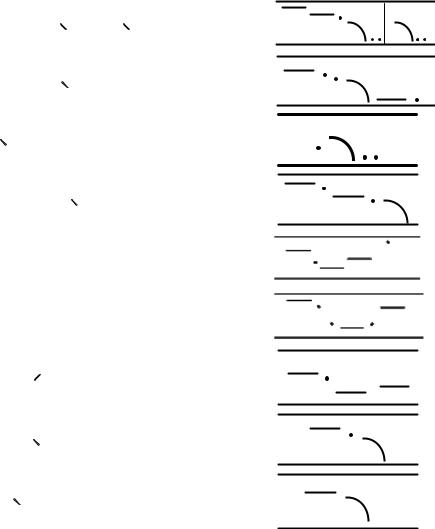
5. [ ]
6. [ : ]
[ ]
[ i: ]
[ ]
7. e
8. [ i: i: ]
9. [ ]
10. [ i: ]
1.She’s away. – It’s a pity.
2.Is the bag black? – Yes, it is.
3.Are the pencils red? – Yes, they are.
4.These sentences are easy, aren’t they?
5.This text is difficult, isn’t it?
6.Pass me that red pencil. It’s my pencil. Give it back to me. Let me take it.
7.Come to my place tonight.
8.Read this text, please.
9.Come at once!
10.Be quick!
Exercises
Ex. 1. Read the following word combinations. Pay attention to assimilation:
[ ] |
[ ] |
[ ] |
[ ( )] |
[ ] |
[ ] |
[ : ] [ ] [ ]
Ex. 2. Distribute the following words into two columnss depending on degree of aspiration:
[ : i: :]
62
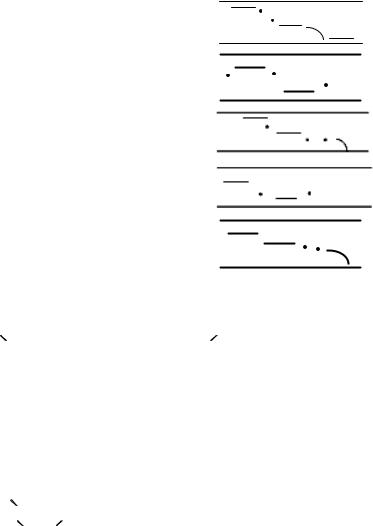
Ex. 3. Transcribe the following sentences, mark stresses and tunes according. Read the sentences:
1. Pass me the black pen, please.
2. Repeat the name, please.
3. Read this letter to Jack.
4. Let me read it.
5. Be ready at ten.
Ex. 4. Make up sentences with the words “let”, “read”, “repeat”, “ask”, “keep”, “tell”, “take”, “send”, “meet”, “give” according to the patterns:
'Take this pen, please. 2. 'Let me 'read the letter, 'please.
Ex. 5. Put general questions to the following sentences. Mark stress and tunes. Read the sentences:
1. The cat is black. 2. The man is thin. 3. These lessons are easy. 4. That exercise is difficult.
Ex. 6. Read the following disjunctive questions substituting the given nouns for the one given in brackets changing the form of the article, [ – ] where necessary:
1.[ ] ([ ])
2.[ ] ([ ])
Ex. 7. Read the second part of the following disjunctive questions with the rising and the falling tunes. Mark stress and tunes. Transcribe and give the tonogramme of the first and the third questions:
l.This is a cap, isn`t it? 2. This is a pan, isn’t it? 3. This is a bad match, isn’t it? 4. This is a fat cat, isn’t it?
Ex. 8. Read the following disjunctive questions and give affirmative answers to them:
1. My cat is nice, isn’t it? 2. My sister is in the yard, isn’t she? 3. These exercises are easy, aren’t they? 4. We are late, aren’t we?
Ex. 9. Change the following statements into disjunctive questions:
1. Nick and Lily are in the garden. 2. The key is in the bag. 3. Dick and Kitty are at the cinema. 4. The pen is in the desk. 5. The apples are in the basket 6. That is a fine bag. 7. This is a bad picture.
Ex. 10. Form the plural of the subjects in the following sentences and make the necessary changes:
l.This garden is large, isn’t it? 2. This exercise is easy, isn’t it? 3. This is a nice flat, isn’t it?
4.This is a black pencil, isn’t it?
63
Ex. 11. Look at the following phrases. Can you notice any difference between the phrases on the left and the phrases on the right?
red eye |
red dye |
bright eyes |
bright ties |
her bread |
herb bread |
top layer |
top player |
big eight |
big gate |
black ape |
black cape |
Ex.12. Practise saying the phrases above correctly.
Ex. 13. Cross out the unpronounced plosive sounds in the following sentences.
a)She was wearing a deep purple evening dress.
b)They had dinner at nine o’clock.
c)We’ve got a flat tyre. I’m afraid.
d)She gave him a quick kiss.
e)You’re a big girl now, dear.
f)We had a really good time at the party.
g)They’ve got a lovely back garden.
Questions
1.What are the peculiarities of the articulation of the vowel sound [ ]?
2.Is the pronunciation of the English vowel [ ] different from the pronunciation of the Russian stressed [a]?
3.When is the English vowel sound [ ] checked?
4.What is the position of the soft palate in the articulation of the phonemes [ ], [ ]?
5.Are the sounds [ ], [ ] always palatalized?
Additional tasks
1.Comment on the phenomenon of “abutting plossives”. Provide examples.
2.Describe the position of the organs of speech in the articulation of the phoneme [j].
3.Speak on the typical mistakes of Russian learners made in the articulation of the English
vowel sound [ ].
4.Give the definition of “a disjunctive question”.
5.Enumerate the chief points concerning disjunctive questions.
Tests
1.Choose the correct variant of pronunciation of the noun “division”:
a)[də’v n];
b)[de’v n];
c)[d ’v n].
2.State in which words the sounds [ ] and [ ] are mostly palatalized:
a)wish;
b)sheep;
c)treasure.
64
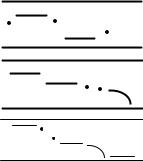
3. Look at the tonogrammes and state on which of them the sentence “Give him a new hat, please” is presented:
a)
b)
c)
4.Choose the correct variant of the disjunctive question:
a)You often go there, do you?
b)They have already come, don’t they?
c)They will have come by the evening, won’t they?
5.“A few” and “a little” in disjunctive questions are:
a)always positive;
b)always imply negative meaning;
c)need a positive tag.
65
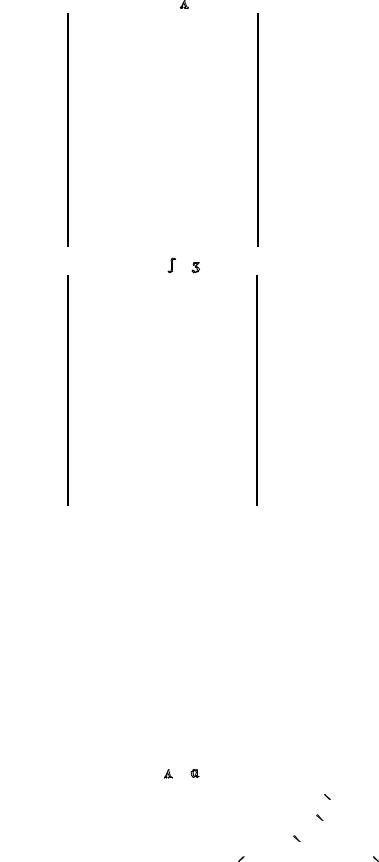
UNIT 7
Go back to the sounds [ ], [ ], [ ] and the abutting plosives from Unit 6
Ex. 1. Practise reading the following words:
|
sun |
[' ] |
|
|
[' ] |
|
done |
|
|
|
[ ] |
|
bulb |
|
|
|
[ ] |
|
bulk |
|
|
|
[ ] |
|
pulse |
|
|
|
[ ] |
|
rough |
|
|
|
[ ] |
|
thus |
|
|
|
[ ] |
|
front |
|
|
|
[ ] |
|
upper |
|
|
|
[ ] |
|
cover |
|
|
|
[ ] |
|
public |
|
shift |
[ ] |
|
shade |
[ ] |
|
share |
[ ] |
|
selfish |
['self ] |
|
|
[ ] |
|
shilling |
||
|
[ : ] |
|
shortly |
||
session |
[ ] |
|
pressure |
[ ] |
|
mention |
['men n] |
|
patient |
['pe nt] |
|
special |
[ spe l] |
|
[ ] |
|
[ ] |
Monday |
|
|
|
|
[ ] |
Sunday |
||
|
|
|
|
|
|
publish |
|
[ ] |
|
|
[ ] |
wonder |
|
|
|
|
[ ] |
suffer |
|
|
|
|
[ ] |
current |
|
|
|
|
|
|
[ ] |
|
comfort |
|
parliament [ : ] colour [ ] country [ ]
[ ], [ ]
banish ['b ] vanish [ van ] Spanish ['sp ] intrusion [ : ] partial [ : ] regime [ i: ] fusion [ : ] precision [ ] transition [ z ] conclusion [ : ] inclusion [ : ]
Ex. 2. Read the following phrases and the sentences. Mind the plosives:
a good day |
mi day |
|
He went to the station |
a black cat |
a book |
case |
They want to speak to you. |
a deep pit |
a lamp |
post |
She wanted to go there |
that table |
fac t |
|
|
that type |
ac t |
|
|
a fruit tree |
ac tress |
|
|
wind direction sit down
the right time
Ex. 3. Read the following sentences:
[ ], [ :]
[ ] [ : ] [ : : ] [ : : ]
66
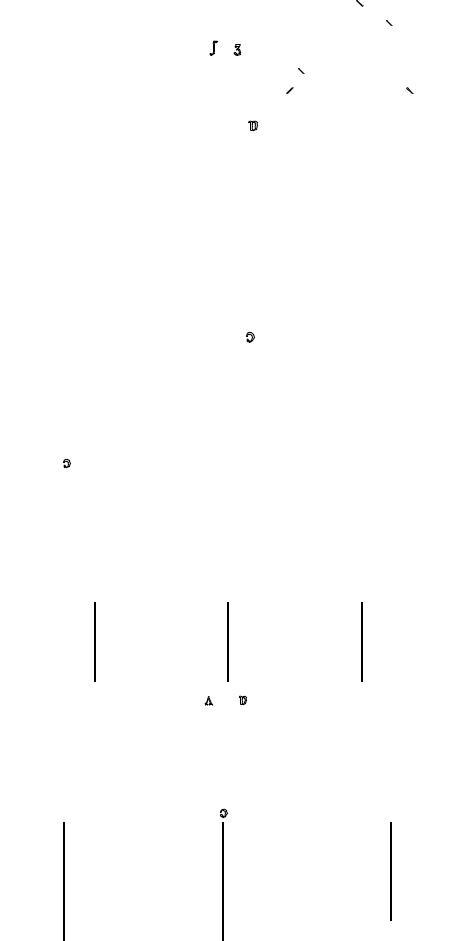
1. |
Eustace saw a yellow yacht. |
[j] |
|
] |
|
|
|||
2. |
Hugh has no sense of humour. |
[ : : |
||
[ : : ] |
||||
1. She is very shy. |
[ ], [ ] |
] |
|
|
|
|
|||
|
|
[ |
|
|
2. Eat with measure, drink with pleasure. [ i: ]
Vowel [ ]
In pronouncing the phoneme [ ] the tongue is held in a position which is further back than that of [ :]. The back of the tongue is raised a little more than for [ :]. The lips are slightly
rounded. The opening between the jaws is wide. It is short, lax and always checked when stressed.
The Russian [o] is closer. In pronouncing the Russian phoneme [o] the lips are not only rounded, but protruded.
Russian learners are apt to replace the English [ ] by the Russian vowel [o]. In order to
prevent or eliminate this mistake the tongue must be held as low down in the mouth and as far back as possible, while the lips must be rounded (but very slightly) and not protruded.
Vowel [ :]
In pronouncing the phoneme [ :] the bulk of the tongue is in the back part of the mouth cavity. The back of the tongue is raised in the direction of the soft palate, a little higher than for [ ]. The lips are tense and rounded to form an opening which is smaller than in the case of the vowel [ ]. The opening between the jaws is medium. The vowel [ :] is long.
The Russian [o] is closer than the English [ :] and more rounded. Russian learners are apt to replace the English [ :] also by the Russian vowel [o]. To prevent or eliminate this mistake the same directions about retracting the tongue must be observed in the case of the vowels [ :] and
[ ], but the lips must be rounded more than in the case of [ ], although not protruded.
Exercises
Ex. 1. Read the following words practising the English sounds:
[ ] [ ] [ ] [ ]
[ – ] [ – ] [ – ]
|
|
[ ] |
|
|
cot |
[ ] |
not |
[ ] |
what |
cock |
[ ] |
fox |
[ ] |
wash |
got |
[ ] |
box |
[ ] |
Scotch |
gone |
[ ] |
lodge |
[ ] |
stop |
|
[ ] – [ ] |
|
|
|
cut – cot |
[ – ] gun – gone |
|||
but – lot |
[ – ] |
putt – pot |
||
nut – not |
|
|
|
|
Ex. 2. Practise reading the following words:
|
|
|
|
|
[ :] |
||
[ :] |
|
bore |
|
[ : ] |
|
|
cause |
[ :] |
|
four |
|
[ : ] |
|
|
because |
[ :] |
|
door |
|
[ : ] |
|
|
small |
[ :] |
|
floor |
|
[ : ] |
|
|
board |
[ :] |
|
your |
|
[ : ] |
|
blackboard |
|
[ :] |
|
thaw |
|
[ : ] |
|
|
thought |
|
|
|
|
|
|
|
|
|
|
|
|
|
67 |
||
[ : ] York [ : ] talk [ : ] wall [ : ] warm [ :k] walk
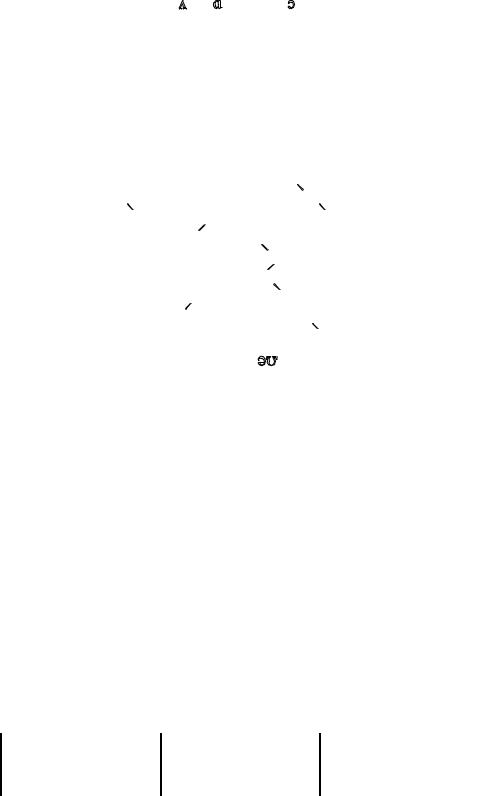
Ex. 3. Read the following words:
|
[ ] – [ :] – [ ] – [ :] |
|
[ – : ] |
[ – : ] |
cut – cart – cot – court |
[ – : ] |
[p – p : ] |
putt – part – pot – port |
[ – : ] |
[ – b :d] |
bud – bard – body – board |
Listen to dialogues № 18.1 and № 19.2 (“What does that model cost?”, “What’s wrong?”) of the linguaphone course “Sound Right”, write them down, transcribe, intone and act them out. Practise reading the tongue twister “Betty Botter” and learn it by heart.
Betty Botter
'Betty 'Botter 'bought some butter. | “ But”, she said, “this butter’s bitter. |
But a bit of better butter |
Will 'make my 'batter better. |
So she bought a 'bit of better butter | And it 'made her 'batter better |
So it was better |
'Betty 'Botter 'bought a 'bit of better butter. ||
Vowel [ ]
In pronouncing both elements of the diphthong [ ] the bulk of the tongue is held in the
position of the back-advanced vowels.
During the pronunciation of the nucleus the back of the tongue is raised in the direction of the soft palate, a little more than for the Russian [o]. The nucleus of [ ] is back-advanced, midopen (a narrow variation of the medium position of the tongue), rounded. During the glide the back of the tongue rises still higher, moving in the direction of [ ]. The glide is rather distinct in stressed syllables and sounds like the vowel [ ]. The lips are slightly rounded at the beginning of the diphthong, but during the glide, i.e. at the end of the diphthong, they are almost as much rounded as for [ ]. During the pronunciation of the nucleus the opening between the jaws is as wide as for the Russian [o], but towards the end of the diphthong it is very narrow.
Russian learners are apt to replace the English diphthong [ ] by the Russian vowel [o] or omit the glide and thus pronounce only the nucleus [o].
In order to prevent or correct the omission of the glide of the diphthong [ ] it is necessary to round the lips still more and pronounce a rather distinct [ ] sound. The whole diphthong [ ] is very much like the combination of two Russian vowel sounds pronounced at the junction of the words “ещё” and “y” in the phrase “ещё у нас” Cf. “ещё y” – [ ] “show”
Ex. 4. Focus on [ ]:
[ ] know
[l ] low [g ] go
[ ld] old [ ] coat [ ] those
[ ] slope [ ] both [ ] woke
[ ] vogue [ ] yellow [ ] narrow
Listen to dialogue № 27.2 (I’ve got to go”) of the linguaphone course “Sound Right”, write it down, transcribe, intone and act it out.
Listen to the dialogue “Snow in October” of London Linguaphone Course “Ship or Sheep”, write it down, transcribe intone and act it out.
68
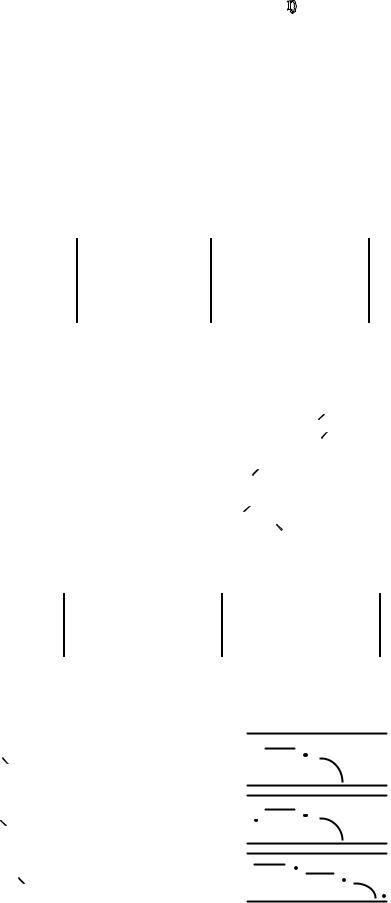
The phoneme [ ]
In the production of the English consonant [ ] the soft palate is lowered. The back part of
the tongue is raised and touches the soft palate, forming a complete obstruction to the flow of air through the mouth cavity. The air passes through the nasal cavity. The vocal cords are drawn near together and vibrate.
In pronouncing the English [ ] Russian learners are apt to replace it by the Russian dental consonant [H] or the English [n]. When [ ] occurs between two vowels, as in the word “singing”, learners usually add the consonant [g] or [k] to [ ].
To prevent or eliminate a superfluous [g] after [ ] between vowels it is recommended to remove the tongue from the palate slowly.
Ex. 5. Read these words. Try not to substitute[ ] for [n]:
[ ] |
sing |
[r ] |
ring |
[ p p ] |
ping-pong |
[d ] |
ding |
[s ] |
song |
[g ] |
gong |
[k ] |
king |
[l ] |
long |
[r ] |
wrong |
[ ] |
thing |
|
|
|
|
Practise reading the following tongue-twister. Make sure that you do not add a [g] to the words ending in [ ]. Learn it by heart.
As I Was Going Along...
As I was 'going a'long, a'long, a long | 'Singing a 'comical 'song, 'song, song. | The 'lane that I 'went
Was ↑so 'long, 'long, long | And the 'song that I 'sang
Was as 'long, 'long, long | And 'so I 'went 'singing a long. ||
Clusters with [w]-see Unit 6
Ex. 6 |
|
|
|
|
|
[twelve] |
twelve |
[kw k] |
quick |
[dw :f] |
dwarf |
['twent ] |
twenty |
[sw m] |
swim |
[dwel] |
dwel |
[t ] |
twice |
|
|
|
|
Reading material
Read the following sentences paying attention to High Fall:
1.
2.
69
